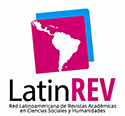An anthropology 'of kinship in politics'
Interest, collective subject and kinship in Argentine trade unions
Abstract
In this article I argue for a kinship anthropology of politics, understood as a focus on the day-to-day imbrications of kinship and politics in a given political space, and the implications of that for the construction of political subjects. I describe kinship within shop-floor-level trade union delegations of state employees in Argentina in three different ways: first, languages of kinship mobilized to describe political allegiance and dispositions, especially inheritance; second, family connections in recruitment and activism; and, third, practices of kinning as relatedness. The combination of these three kinship modes creates the union as kin group, and enables it to act on the world politically in order to transform it.Downloads
References
Alonso, A. M. (1994). The politics of space, time and substance: state formation, nationalism, and ethnicity. Annual Review of Anthropology, 23, 379-405.
Auyero, J. (2001). Poor people’s politics: Peronist survival networks and the legacy of Evita. Durham: Duke University Press.
Bear, L. (2007). Lines of the nation: Indian railway workers, bureaucracy, and the intimate historical self. Nueva York: Columbia University Press.
Bear, L. (2013). ‘This body is our body’: Vishwakarma Puja, the social debts of kinship, and theologies of materiality in a neoliberal shipyard. En S. McKinnon y F. Cannell (Eds.). Vital relations: modernity and the persistent life of kinship (pp. 155-178). Santa Fe, N.M.: School for Advanced Research Press.
Bodenhorn, B. (2013). On the road again: movement, marriage, mestizaje, and the race of kinship. En S. McKinnon y F. Cannell (Eds.). Vital relations: modernity and the persistent life of kinship (pp. 131-154). Santa Fe, N.M.: School for Advanced Research Press.
Bourdieu, P. y J.- C. Passeron (1977). Reproduction in education, society, and culture. Londres: Sage.
Carsten, J. (Ed.) (2000). Introduction: Culture of relatedness. En Cultures of relatedness: new approaches to the study of kinship (pp. 1-36). Cambridge: Cambridge University Press.
Carsten, J. (2004). After kinship. Cambridge: Cambridge University Press.
Carsten, J. (2013). Introduction: blood will out. Journal of the Royal Anthropological Institute (N.S.) Special Issue: Blood will out: essays on liquid trasfers and flows, S1-S23.
Christiano, T. (2015). Democracy. En The Stanford encyclopedia of philosophy. Recuperado de https://plato.stanford.edu/archives/spr2015/entries/democracy/
Collier, J. F. (1987). Gender and kinship: essays toward a unified analysis. Stanford: Stanford University Press.
Das, V. (2015). Ordinary ethics. En D. Fassin (Ed.). A companion to moral anthropology (pp. 133-149). Malden: Wiley-Blackwell.
Elena, E. (2011). Dignifying Argentina: Peronism, citizenship, and mass consumption. Pittsburgh: Pittsburgh University Press.
Eriksen, T. H. (2010). Ethnicity and nationalism: anthropological perspectives. Londres: Pluto Press.
Etchemendy, S. (2013). La ‘doble alianza’ gobierno-sindicatos en el kirchnerismo (2003-2012): orígenes, evidencias y perspectivas. En C. Acuña (Ed.). Instituciones gubernamentales y actores de la política argentina (pp. 291-324). Buenos Aires: Siglo XXI.
Etchemendy, S. y Collier, R. B. (2007). Down but not out: union resurgence and segmented neocorporatism in Argentina (2003-2007). Politics & Society, 35, 363-401.
Faubion, J. D. (2011). An anthropology of ethics. Cambridge: Cambridge University Press.
Forbess, A. y Michelutti, L. (2013). From the mouth of God: divine kinship and popular democratic politics. Focaal: Journal of Global and Historical Anthropology, 67, 3-18.
Fortes, M. (1969). Kinship and the social order: the legacy of Lewis Henry Morgan. Londres: Routledge & Kegan Paul.
Fortes, M. y Evans-Pritchard, E. (Eds.) (1940). African political systems. Londres: Oxford University Press for the International African Institute.
Foucault, M. (1990). The history of sexuality, vol. 3: The care of the self. Londres: Penguin.
Gluckman, M. (1965). The ideas in Barotse jurisprudence. New Haven: Yale University Press.
Halperin Donghi, T. (2012 [1994]). La larga agonía de la Argentina peronista. Buenos Aires: Ariel.
Herzfeld, M. (2007). Global kinship: anthropology and the politics of knowing. Anthropological Quarterly, 80, 313-323.
Hirschman, A. (1977). The passions and the interests: political arguments for capitalism before its triumph. Princeton: Princeton University Press.
Howell, S. (2006). Kinning of foreigners: transnational adoption in a global perspective. Oxford: Berghahn Books.
James, D. (1988). Resistance and integration: Peronism and the Argentine working class, 1946-1976. Cambridge: Cambridge University Press.
Keane, W. (2016). Ethical life: its natural and social histories. Princeton: Princeton University Press.
Korab-Karpowicz, W. J. (2017). Political realism in international relations. En The Stanford encyclopedia of philosophy. Recuperado de https://plato.stanford.edu/archives/sum2017/entries/realism-intl-relations/
Kuper, A. (2015). Anthropology and anthropologists: the British school in the twentieth century. Londres: Routledge.
Laidlaw, J. (2014). The subject of virtue: an anthropology of ethics and freedom. Cambridge: Cambridge University Press.
Lambek, M. (2010). Ordinary ethics: anthropology, language, and action. Nueva York: Fordham University Press.
Lambek, M. (2013). Kinship, modernity and the immodern. En S. McKinnon y F. Cannell (Eds.). Vital relations: modernity and the persistent life of kinship (pp. 241-260). Santa Fe, N.M.: School for Advanced Research Press.
Lazar, S (2015). Of autocracy and democracy, or discipline and anarchy: when organizational structure meets political ideology in Argentinean public sector trade unions. Political and Legal Anthropology Review (PoLAR), 38, 279-99.
Lazar, S (2019). ¿Cómo se construye un sindicalista? Vida cotidiana, militancia y afectos en el mundo sindical. Ciudad de Buenos Aires: Siglo XXI.
Levitsky, S. (2003). From labor politics to machine politics: the transformation of party-union linkages in Argentine Peronism, 1983-1999. Latin American Research Review, 38(3), 3-36.
Lomnitz, C. (1995). Ritual, rumor and corruption in the constitution of polity in modern Mexico. Journal of Latin American Anthropology, 1, 20-47.
MacCormack, C. P. y Strathern, M. (1982). Nature, culture, and gender. Cambridge: Cambridge University Press.
Malinowski, B. (1985 [1926]). Crimen y costumbre en la sociedad salvaje. Barcelona: Planeta Dagostini.
Malinowski, B. (1930). Kinship. Man, 30, 19-29.
Malloy, J. (1977). Authoritarianism and corporatism in Latin America. Pittsburgh: Pittsburgh University Press.
Manzano, V. (2013). La política en movimiento: movilizaciones colectivas y políticas estatales en la vida del Gran Buenos Aires. Rosario: Prohistoria.
McKinley, R. (2001). The philosophy of kinship: a reply to Schneider’s critique of the study of kinship. En R. Feinberg y M. Ottenheimer (Eds.). The cultural analysis of kinship: the legacy of David M. Schneider (pp. 131-167). Chicago: University of Illinois Press.
McKinnon, S. y Cannell, F. (Eds.) (2013a). Vital relations: modernity and the persistent life of kinship. Santa Fe, N.M.: School for Advanced Research Press.
McKinnon, S. y Cannell, F. (Eds.) (2013b). The difference kinship makes. En Vital relations: modernity and the persistent life of kinship (pp. 3-38). Santa Fe, N.M.: School for Advanced Research Press.
Pitt-Rivers, J. (1973). The kith and the kin. En J. Goody (Ed.). The character of kinship (pp. 89-106). Cambridge: Cambridge University Press.
Robbins, J. (2013). On kinship and comparison, intersubjectivity and mutuality of being. Hau: Journal of Ethnographic Theory, 3(2), 309-316.
Rosaldo, M. Z. y Lamphere, L. (1974). Woman, culture, and society. Stanford: Stanford University Press.
Sahlins, M. (2013). What kinship is – and is not. Chicago: Chicago University Press.
Schmitter, P. C. (1974). Still the century of corporatism? The Review of Politics, 36, 85-131.
Schmitter, P. C. (2006). Interests. European University Institute, Department of Political and Social Sciences.
Schneider, D. (1980). American kinship: a cultural account. Chicago: Chicago University Press.
Service, E. R. (1985). A century of controversy: ethnological issues from 1860 to 1960. Orlando: Academic Press.
Shever, E. (2012). Resources for reform: oil and neoliberalism in Argentina. Stanford: Stanford University Press.
Shever, E. (2013). ‘I am a petroleum product’: making kinship work on the Patagonian frontier. En S. McKinnon y F. Cannell (Eds.). Vital relations: modernity and the persistent life of kinship (pp. 85-108). Santa Fe, N.M.: School for Advanced Research Press.
Stasch, R. (2009). Society of others: kinship and mourning in a West Papuan place. Berkeley: University of California Press.
Stoler, A. L. (2002). Carnal knowledge and imperial power: race and the intimate in colonial rule. Berkeley: University of California Press.
Strathern, M. (2015). Axioms of amity: a tribute. Presentación en el workshop ‘The Legacies of Meyer Fortes’, Trinity College, Cambridge. Inédito.
Torre, J. C. (1998). The ambivalent giant: the Peronist labor movement, 1945-1995. En J. Brennan (Ed.). Peronism and Argentina (pp. 125-140). Wilmington: Scholarly Resources.
Torre, J. C. (2012). Ensayos sobre movimiento obrero y peronismo. Buenos Aires: Siglo XXI.
Wade, P., García Deister, V., Kent, M., Olarte Sierra, M. F. y Díaz del Castillo Hernández, A. (2014). Nation and the absent presence of race in Latin American genomics. Current Anthropology, 55, 497-522.
Weber, M. (1968 [1922]). Economy and society: an outline of interpretive sociology. Nueva York: Bedminster Press.
Wiarda, H. (2005). Authoritarianism and corporatism in Latin America – revisited. Gainsville: University Press of Florida.
Wolanski, S. (2015). La familia telefónica: sobre las relaciones de parentesco en la política sindical. Cuadernos de Antropología Social, 42, 91-107.
Yanagisako, S. (2002). Producing culture and capital: family firms in Italy. Princeton: Princeton University Press.
Yanagisako, S. (2013). Transnational family capitalism: producing ‘Made in Italy’ in China. En S. McKinnon y F. Cannell (Eds.). Vital relations: modernity and the persistent life of kinship (pp. 63-84). Santa Fe, N.M.: School for Advanced Research Press.
Yanagisako, S. y Collier, J. F. (Eds.) (1987). Toward a unified analysis of gender and kinship. En Gender and kinship: toward a unified analysis (pp. 14-50). Stanford: University Press.

Runa, archivos para las ciencias is a publication of the Instituto de Ciencias Antropológicas, Facultad de Filosofía y Letras, Universidad de Buenos Aires and is distributed under a Creative Commons Attribution 4.0 International License.
Runa maintains its commitment to the policies of Open Access to scientific information, considering that both scientific publications and publicly funded research should circulate on the Internet freely, free of charge and without restrictions.
The contents and opinions expressed in published articles are the sole responsibility of their authors.



















